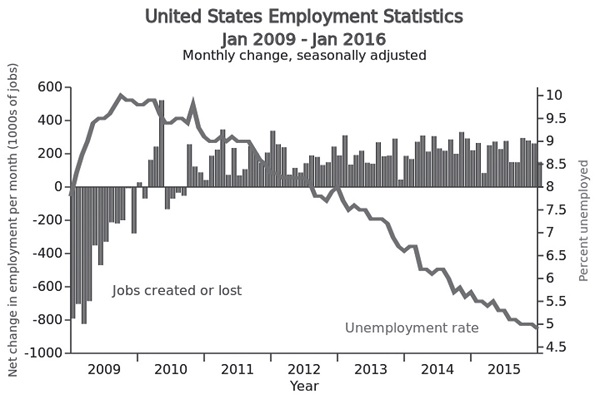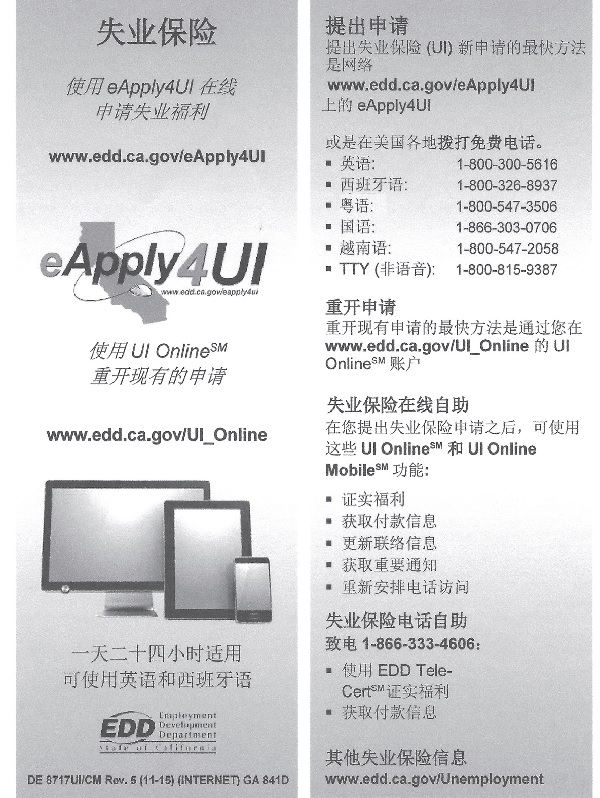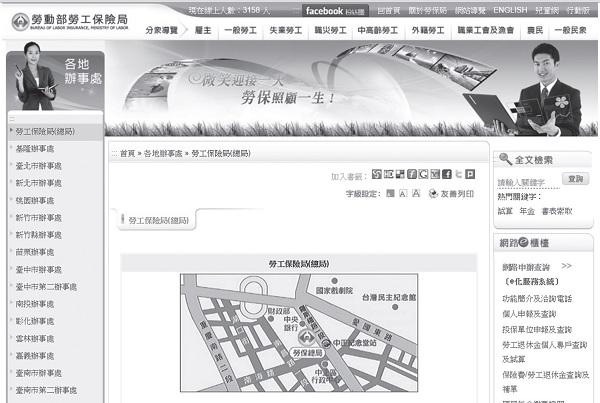Meeting God in the Valley of Unemployment
/ Encountering God in workplace difficulties /

“You shall remember the LORD your God, for it is he who gives you the strength to gain wealth.” (Deuteronomy 8:18)
There are generally four ways to leave a company or organization in the workplace: retirement, resignation, being fired or being laid off. Retirement is when the accumulated service period meets the retirement regulations. Resignation refers to voluntarily resigning for many reasons, most of which are due to finding a new position (the best case scenario is to meet retirement standards and transfer to another organization to serve). Dismissal refers to firing, when an employee makes a major mistake or is fired for other reasons. U.S. labor laws stipulate that companies cannot fire employees at will, so layoffs (laid-off) have become a popular method. Layoffs are when a company reduces the number of employees due to economic downturn or poor operations, or makes positions redundant, so that the affected employees are forced to resign, but there is usually some severance payment. , so layoffs are also called redundancies. In addition, the impact will be less severe by requiring employees to take unpaid leave and return to work after operations are normal.

▲Circuit City in the United States laid off all 35,000 employees during the financial tsunami and then went out of business. (Source: By Niceckhart – Own work, CC BY-SA 3.0, quoted from commons.wikimedia.org/w/index.php?curid=26075160)
The most worrying thing in the workplace is being fired or laid off (hereinafter referred to as layoffs). Take the economic situation in the United States as an example. In the past fifteen years, an average of about 20 million people have been laid off every year, accounting for one-fifth of the working population. Among them, the 20% unemployed have been unable to find a job and have even become homeless. . For example, in 2014, an average of 152,400 people left their original jobs every day, of which 56,000 were laid off, but 160,800 were hired. In other words, on average, 160,800 people were hired every day. 8,400 more than those who resigned. Such data puts the unemployment rate in the United States between 5 and 7% in recent years (6.1% in 2015), which is still the best among advanced countries, and its economic growth is also relatively stable. Spain has the highest unemployment rate in Europe. The overall unemployment rate in 2015 was 24.2%, and the youth unemployment rate was as high as 48.4% (11.6% in the United States). In comparison, the United States is like a land of employment.
Although the above data on layoffs does not distinguish between reasons, including business closures, profit declines, mergers or downsizing, it is a blow to everyone who loses their job. The process of finding a new job can be easy, or it can be extremely difficult. Many people take a year or two to find a job. For Christians, the job search process is also a test of spiritual faith. This article intends to explore how Christians can calmly cope with and find jobs when faced with the crisis of unemployment; more importantly, they must strengthen their trust in God in the face of unemployment, go through trials, and move forward in their spiritual journey.

▲Statistical chart of employment trends in the United States in recent years. Image source: By Ben Moore – Own work, CC BY-SA 3.0, https://commons.wikimedia.org/w/index.php?curid=30968718
1. When being laid off
Regardless of whether there is warning or not, when you are notified that you are a target of layoffs, you will inevitably feel shocked and sad. Especially when the laid-off person is the main source of family income, the question that immediately comes to mind is how to take care of the family without an income? The most important thing at this time is to keep calm and face difficulties with a prayerful attitude; secondly, self-examination of the reasons for being laid off:
1. Is it because of yourself?This situation usually results in being fired or fired. It could be a lack of fit, performance that falls short of your boss's expectations, or a big mistake, such as being dishonest or cheating. Unsuitable means that you are not suitable for this position. You may be able to make full use of your talents by changing to a position that suits your expertise and abilities. If your performance is not good, you need to examine the reasons and face it with an open mind. If you make a mistake, especially dishonesty or fraud, you must confess and repent before God. Sometimes you encounter a boss with a bad temper or questionable character. He is jealous of the talents of his subordinates and will unreasonably suppress or even insult them; or he or she may discriminate on the basis of race or gender. Although there are certain protections in the labor law, this situation must be dealt with prudently. . Those who work in government agencies or state-owned enterprises and have formal positions, commonly known as golden rice bowls or iron rice bowls, are usually protected by regulations and have much less chance of being laid off than employees in private enterprises or contractors.
2. Is it because of the operations of the company or organization?For example, companies close down or merge, or because the overall economic situation is poor, the company's operations are poor, the company outsources the work of certain departments abroad, and some positions are declared redundant, etc., causing the company to reduce costs by laying off employees. to increase business performance. Around the central government or local government agencies, there are many companies, universities or research institutions that are contractors for various research projects of public agencies or private organizations. Because certain projects were not awarded and funds were insufficient, they were Layoffs. Even most state governments in the United States are legally prohibited from running budget deficits. Under budget constraints, they have to lay off employees, especially some employees who do not have long-term job security. Some layoffs come with advance warning, while others come without warning, and the result is that they are all forced to leave.
Regardless of the reason, you should avoid quarrels with your employer unless necessary (for example, to complain about discrimination or for reasons of fairness). Especially when the interaction with the company was good, and being laid off is a last resort measure by the company, it is necessary to maintain a good relationship with the employer (or boss), which will be helpful in the next step of finding a job, because you can ask the employer (or boss and Colleagues) write favorable letters of recommendation. Sometimes the department of the person involved deletes the position, and there may still be vacancies in other departments, and you can apply. If successful, it will become a transfer, and there is no risk. If you end up leaving the company, be prepared to find a new job outside. Every country has legislation to protect the rights and interests of employees. For example, the U.S. Department of Labor has stipulated certain rights, such as medical insurance and unemployment benefits, for employees whose work has been terminated (termination), that is, unemployed employees. It takes time to understand.
2. How to adjust? The following comments are for reference:
1. Maintain a healthy attitude—When you get the news, support yourself with prayer immediately and receive it with a peaceful heart. Don't be afraid of others knowing. Many times, for the sake of face, we are embarrassed to let others know that we are unemployed. Doing so is not good for our mental health, and we also lose opportunities for consultation and prayer. Let relatives, friends and the church know, and you can get help and encouragement from family and friendship, and get over the difficulties earlier.
2. Communicate with family, friends and church members.In addition to close relatives and friends, when you lose your job, notify the church pastor, elders and prayer group members, and let the church as a whole pray for you and your family, asking God to help give you peace, which can make your job search smoother - those who are enlightened will help more. The best way and testimony to test faith and help each other among church members. (See James 5:16, “The prayer of a righteous man has great effect.”)
3. Adjustment of mentality.Unemployment is a blow to your self-esteem and mood, but don’t give up on yourself, but be humble before God, believe that this is allowed by God, and must be of God’s good will, and use this to exercise your faith. Unemployment is not a shameful thing, and most of the time it is not something you can control. Therefore, you must face up to and examine the value of your life—you are a precious child of Heavenly Father, and He will not abandon you.
We have seen many similar examples in the church, where most members who lost their jobs found new jobs, or even better jobs. The most touching thing is that these members have strong faith. During their unemployment period, they prayed more actively, lived a good spiritual life, had better fellowship with the Lord, and enthusiastically participated in church services. Even in difficult economic circumstances, they still Give money generously to the church or cause. They also testified that during their unemployment period, they were able to get closer to the Lord and "encounter God"!
Indeed, it is normal for unemployed people to worry and worry during the job search process, but they must learn to let go of their burdens and keep the words of the Lord Jesus in mind: “Therefore, do not worry about tomorrow, for tomorrow will have its worries; take care of each day’s difficulties one day at a time. That's enough." (Matthew 6:34)
4. When you first lose your job, keep a calm mind.Don’t panic all of a sudden and rush to find a job. First, pray quietly to the Lord for help, and carefully consider the next step, including financial planning and job hunting.

▲California Unemployment Insurance Application Card (full). (Source: http://www.edd.ca.gov/unemployment/Forms_and_Publications.htm)
3. Financial planning
Start by assessing how many resources are available to help your family survive without your income before looking for your next job. Take the situation in the United States as an example:
1. Try to seek redundancy compensation (severance payment) provided by the company.If the reason for the layoff is not your fault and the company apologizes, usually there will be a compensation payment according to the company or institution's policy. The amount is different for each institution, based on a total amount or salary, ranging from a few months to two years. This compensation can help the unemployed to find a new job for a period of time without interrupting their family income.
2. Apply for unemployment benefits (unemployment benefits).Many countries provide benefits (or unemployment insurance) to the unemployed to help them maintain their family income while seeking employment. Unemployment benefits in the United States are provided to unemployed applicants according to different conditions in each state. It is usually paid weekly based on a certain proportion of the unemployed person's salary, which varies from state to state (for example, the maximum weekly amount in Connecticut is $590, while the maximum weekly amount in Alabama is $265), and the period is usually six months; The payment period is also extended during economic downturns. The source of funds is payroll taxes paid by employers by states and the federal government; the unemployed are eligible for benefits if they were laid off through no fault of their own. If the relief period has expired, there will be no subsidy and you will have to rely on other sources - your own savings, support from relatives, friends or churches, etc. Many European countries have relatively good unemployment benefits. After the relief period, there are other subsidies until you find a job or even reach retirement age, and then transfer to the national pension plan.
3. Use the emergency fund.You should always have an emergency fund prepared for unexpected needs, usually three to six months of household expenses (including housing mortgage loans). It should be placed in a current deposit or money fund and can be used at any time.
4. Use the savings accumulated in the past.If the above three resources are exhausted and you still haven't found a job, you need to use your savings, but try to avoid using 401k (US) or other statutory retirement funds.
Add up the above numbers and you'll get an idea of how long unemployment can last. For example, if you have the first three resources, you can usually survive for at least a year without causing a crisis to your family life, so you don't have to rush to find a job or accept a job that is not very suitable for you. If your spouse has a legitimate job, there will be fewer problems; if the family only relies on your income, the problem will be bigger, especially if you are under mortgage loan pressure. In addition, young people may be able to return to their parents or relatives for temporary support.
5. Handle medical insurance matters.If your spouse has formal employment and medical insurance, the problem is smaller; if your family only relies on your medical insurance at work, US law stipulates that employers may need to notify unemployed employees to join the company's medical insurance. These are all under two bills: COBRA (The Consolidated Omnibus Budget Reconciliation Act) or HIPAA (Health Insurance Portability and Accountability Act) - means that company employees and their families have the right to continue to join the original insurance for a buffer period when they lose their medical insurance. If the time limit has passed, you will have to find another insurance, and the cost will be higher at that time.

▲Unemployed people. Photo from Wall Street Journal, http://www.wallstreetdaily.com/2013/05/06/unemployment-rate-jobs-market/
4. Apply for jobs
If you have the financial resources to last for a period of time (at least six months, preferably more than a year), you can evaluate your expertise and suitable work. If necessary, you can also consider returning to school or training institutions to study.
1. Find various resources to find a job
Design your resume – Ask someone experienced in this area to help you redesign your resume to appeal to future employers.
Find appropriate recommenders—including asking your bosses or colleagues from previous companies or institutions, or mentors who know you well to write letters of recommendation.
Introduced by relatives, friends or professional society.
Many of the unemployed are in the older age group, especially high-tech talents who have served as middle- and senior-level supervisors, and sometimes it is difficult to find new jobs. If you really can't find a suitable and well-paid job before your resources are exhausted, and you can't wait any longer, you have no choice but to find a job with a lower salary than before to maintain your family's livelihood, because taking care of your family is a Christian's priority. (1 Timothy 5:8, "Whoever does not take care of his relatives has denied the faith and is worse than an unbeliever. Especially if he does not take care of his own household.") At this time, you must learn to put down your dignity. , striking a balance between family needs and personal interests or ambitions, looking forward to a "comeback" in the future.
By the way, since short-term unemployment is becoming more and more common, some American churches have established "Job Counseling Fellowships" for unemployed job seekers, which is a good way to connect and encourage unemployed members. In addition to newspapers and general job search websites, there are also organizations on the web that introduce jobs to Christian job seekers, which you can refer to.

▲臺灣勞動部勞工保險局各地辦事處。(資料來源:http://www.bli.gov.tw/sub.aspx?a=SMtW%2fiIKm6w%3d)
2. Save consumption
During the period of unemployment, financial resources are tight, and it is necessary to have a new household income and expenditure budget, try to save as much as possible, and reduce unnecessary expenses. For children who are already sensible, inform them of the situation and ask them to cooperate in getting through the difficulties. The whole family should diligently and actively pray together before the Lord, asking Him to arrange suitable work. Husbands and wives should not get angry and quarrel with each other while their spouses are job hunting. Instead, they should encourage and support each other.
If you have debt, take the initiative to contact the lending bank. It is best not to owe any credit cards or consumer loans except for the mortgage loan. If you are really short of money, you have no choice but to seek temporary help from relatives and friends. If you still have the ability, you should continue to donate generously to churches or gospel institutions, believing that God will bless you more.
5. Maintain confidence
Christians often forget the grace given by God in good times, but when we encounter difficulties in the workplace or in life, such as unemployment, or suffering or illness, it is easier for us to get closer to God, and therefore it is easier for us to "meet God." When you are unemployed or looking for a job, you should strive to achieve peace and joy in your life, knowing that everything is in the hands of God. In terms of personal spiritual practice, I pray more and read the Bible, continue to serve in the church, and live a life that pleases God. I believe that there will always be God’s good arrangements in the end, and I may even find a better job than before.
There are many verses in the Bible that can be used to encourage and cheer up unemployed Christians. For example, Psalm 46:1: “God is our refuge and our strength, an ever-present help in trouble. ” James 1:2: “Consider it all joy whenever you face trials of many kinds.” 1 Peter 1:6-7 also encourages those who are being tried: “…in all kinds of trials you will face.” “Grieve you for a little while during trials, so that the testing of your faith, more precious than gold which perishes even though it is tested by fire, may be found to praise, glory, and honor at the revelation of Jesus Christ.”
We must believe that each of us is precious to the Lord and He will not abandon us. Jesus said, “This is the will of Him who sent me: that I may lose nothing of what He has given me, but raise it up at the last day.” (John 6:39) Paul said, “Who can connect us with Is it separation? Is it hardship? Is it hunger? Is it danger? ...For I am convinced that neither death nor life... Nothing can separate us from the love of God which is in Christ Jesus our Lord” (Romans 8:35-39).
During the period of unemployment and job hunting, in addition to testing your faith, you must also believe that everything will pass until you find the job arranged by God, because the ability to make money is given by God (Deuteronomy 8:18), and as the Bible says: " We want each of you to show this diligence so that you may have full hope to the end” (Hebrews 6:11).
 The author's profile: Wen Yingqian, holds the American Financial Analyst (CFA) certificate, is the chairman of the board of directors of the Christian Association of China Resources, and is the editor of the national talent unit of this magazine. He is currently an honorary professor in the Department of Economics and Finance at Dong Hwa University in Taiwan and the director of the American Chinese Outreach Ministry of Crown Financial Ministries in the United States.
The author's profile: Wen Yingqian, holds the American Financial Analyst (CFA) certificate, is the chairman of the board of directors of the Christian Association of China Resources, and is the editor of the national talent unit of this magazine. He is currently an honorary professor in the Department of Economics and Finance at Dong Hwa University in Taiwan and the director of the American Chinese Outreach Ministry of Crown Financial Ministries in the United States.
